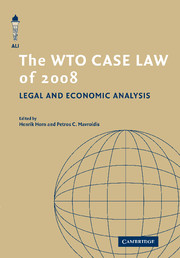Book contents
- Frontmatter
- Contents
- Foreword
- Introduction
- Appellate Body Report in EC–Bananas III: waiver-thin, or lock, stock, and metric ton?
- Guilt by association: US – Measures Relating to Shrimp from Thailand and US – Customs Bond Directive for Merchandise Subject to Anti-Dumping/Countervailing Duties
- Mexico–Olive Oil: Remedy without a cause?
- US–Stainless Steel (Mexico)
- Continued Suspense: EC–Hormones and WTO Disciplines on Discrimination and Domestic Regulation
- United States – Subsidies on Upland Cotton Recourse to Article 21.5 by Brazil
- China – Measures Affecting Imports of Automobile Parts
- India – Additional and Extra-Additional Duties on Imports from the United States
- Comment: India – Additional and Extra-Additional Duties on Imports from the United States
Continued Suspense: EC–Hormones and WTO Disciplines on Discrimination and Domestic Regulation
Published online by Cambridge University Press: 07 September 2011
- Frontmatter
- Contents
- Foreword
- Introduction
- Appellate Body Report in EC–Bananas III: waiver-thin, or lock, stock, and metric ton?
- Guilt by association: US – Measures Relating to Shrimp from Thailand and US – Customs Bond Directive for Merchandise Subject to Anti-Dumping/Countervailing Duties
- Mexico–Olive Oil: Remedy without a cause?
- US–Stainless Steel (Mexico)
- Continued Suspense: EC–Hormones and WTO Disciplines on Discrimination and Domestic Regulation
- United States – Subsidies on Upland Cotton Recourse to Article 21.5 by Brazil
- China – Measures Affecting Imports of Automobile Parts
- India – Additional and Extra-Additional Duties on Imports from the United States
- Comment: India – Additional and Extra-Additional Duties on Imports from the United States
Summary
Abstract: Based on the reasoning of the Appellate Body in Canada/United States – Continued Suspension of Obligations in the EC–Hormones Dispute (‘Continued Suspension’), this paper analyzes the distinction between the national-treatment obligation under Article III of GATT and the requirement under the Agreement on Sanitary and Phytosanitary (SPS) Measures that such measures be based on a risk assessment that takes into account available scientific evidence. The Appellate Body's reasoning makes clear that the primary purpose of the SPS Agreement is to discipline discriminatory regulation, and not the level of protection. We argue that the case clarifies that de facto protection (market segmentation) created by an SPS measure must be motivated by demonstrating that the measure is addressing a market failure, as reflected in the existence of some scientific basis for a health or safety concern. The scientific-basis requirement is a means for determining the intent of an SPS measure. While this is a factor that is ostensibly not relevant in GATT national-treatment cases, the need for scientific justification is not a move away from a concern with preventing illegitimate discrimination against imported products.
Introduction
In the case of Canada/United States – Continued Suspension of Obligations in the EC – Hormones Dispute (Continued Suspension), the European Communities (EC) challenged continued suspension of WTO concessions by the US and Canada.
- Type
- Chapter
- Information
- The WTO Case Law of 2008 , pp. 151 - 180Publisher: Cambridge University PressPrint publication year: 2010

